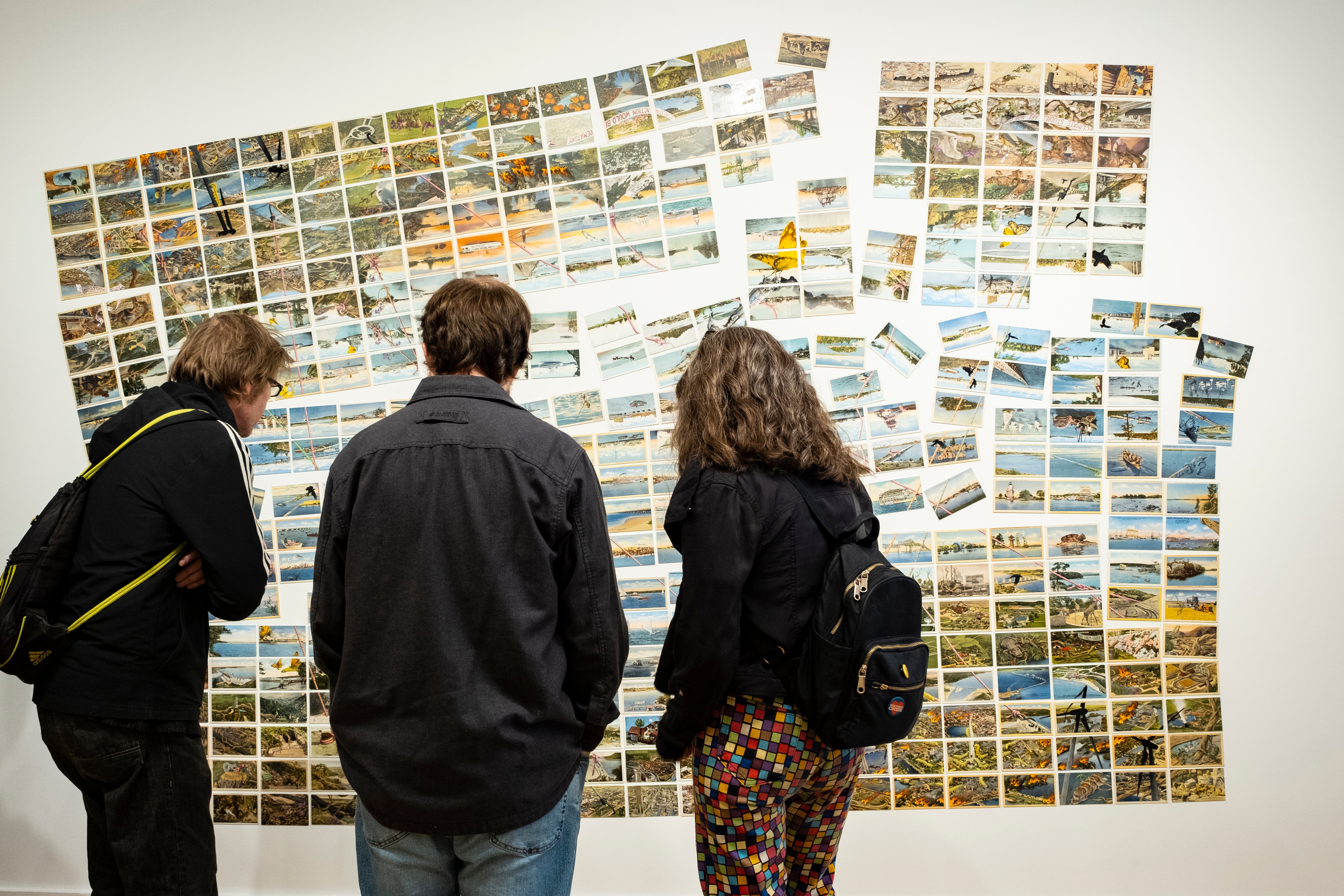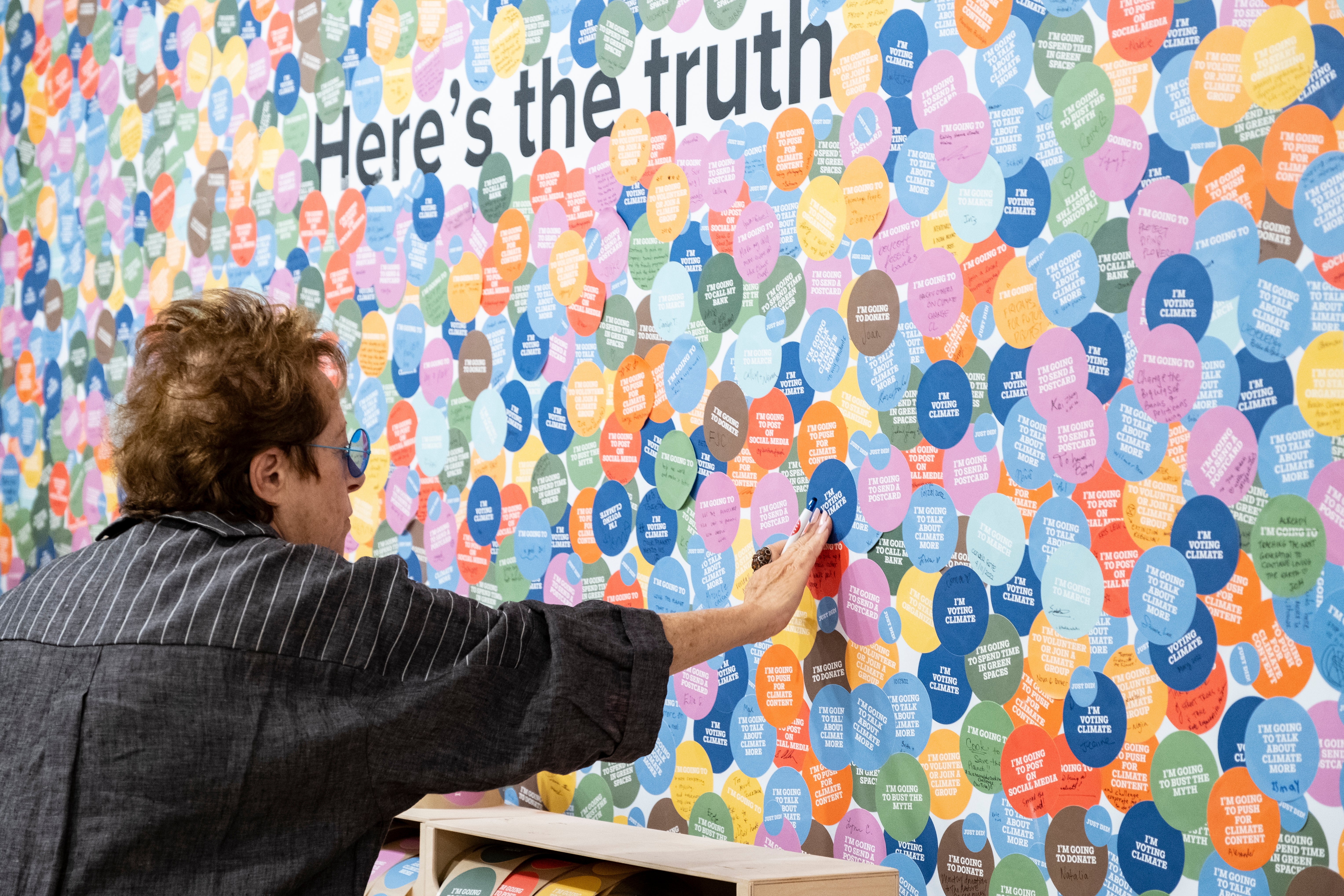‘The arts make us see possibilities that nothing else does’: Inside America’s first climate museum
More than 105,000 people have been to The Climate Museum in New York City
Your support helps us to tell the story
From reproductive rights to climate change to Big Tech, The Independent is on the ground when the story is developing. Whether it's investigating the financials of Elon Musk's pro-Trump PAC or producing our latest documentary, 'The A Word', which shines a light on the American women fighting for reproductive rights, we know how important it is to parse out the facts from the messaging.
At such a critical moment in US history, we need reporters on the ground. Your donation allows us to keep sending journalists to speak to both sides of the story.
The Independent is trusted by Americans across the entire political spectrum. And unlike many other quality news outlets, we choose not to lock Americans out of our reporting and analysis with paywalls. We believe quality journalism should be available to everyone, paid for by those who can afford it.
Your support makes all the difference.Nestled among the designer boutiques on a cobbled street in New York’s SoHo, sits a true pioneer: America’s first-ever museum dedicated to the climate crisis.
For the past five years, The Climate Museum has hosted exhibitions, art installations, talks, performances and workshops across the five boroughs and online, reaching more than 105,000 people.
Since October, it has been a pop-up museum in a bright and airy space on Wooster Street where it’s free for anyone to visit on afternoons from Wednesday until Sunday.
The museum has both art works and interactive exhibits – a recording booth to share messages on the climate crisis; a sticker station to add your climate resolutions to an ever-growing wall; stacks of postcards for writing to a lawmaker of your choosing (which staff will stamp and post).
While the atmosphere is light and welcoming, there’s a serious mission at work to tap into a deep, often unvoiced, sense of aloneness which can overwhelm people when they begin to contemplate the vast and amorphous climate crisis.
Tackling it won’t just need Big Tech and ambitious government policies but also a groundswell of cultural support and public engagement, says the museum’s founder and director Miranda Massie.
“The arts open us up and make us see the possibilities of what we can do as a human community in a way that nothing else does,” she said, at a presentation on Tuesday.
“What we feel most of all in the climate crisis is alone, isolated, and outnumbered. Like anything that we could do is not big enough, it’s not the right scale.”
Museums also occupy a unique position in the American psyche with “superpowers” of trust and popularity, Ms Massie says.
More Americans visit art museums, science centres, historic houses or sites, zoos, or aquariums than attend professional sporting events, according to the American Alliance of Museums. And they maintain a rare position of trust among the public, even amid rife disinformation and fraying of longheld social norms.
“Museums have an ethical responsibility to address the challenges that are faced by humanity,” Ms Massie said.
“In order to maintain that trust and popularity we have to be relevant, address what people care about and what people are challenged by.

“For us, that means a call for museums to address the climate crisis more broadly – whether they’re climate-dedicated or not.”
The Climate Museum has hosted more than 250 events including recently Bill McKibben, the author and veteran environmental activist who founded 350.org; and Rollie Williams, a New York stand-up and YouTuber, who uses comedy to demystify climate change.
To celebrate Earth Day on 22 April, New York and New Jersey university professors will gather to talk about the launch of the modern environmental movement.
And up until the venue closes at the end of this month, it is showcasing Someday, all this – a striking piece by the artist David Opdyke, whose work is part of collections at MOMA and the Brooklyn Museum.
Using 400 hand-modified, vintage postcards, the piece is a commentary on the climate crisis across America, using both real and imaginary themes, to explore issues of displacement, migration and societal breakdown.
Ms Massie left behind her career as a civil rights impact litigator to found the museum in the wake of 2012’s Superstorm Sandy. (Factors linked to rising global temperatures intensified the storm which devastated New York, leaving 44 people dead and $19bn in damages.)
She explained that the idea came to her so clearly and intuitively that she assumed that she had read about it somewhere else.
“When I Googled it, and discovered that we would be the first [climate museum] in the US and one of the first in the world, I was astounded. I’m still astounded. We got the URL, climatemuseum.org, for free,” she said.
While some major art, science and cultural institutions have come under fire for their fossil fuel sponsorship, The Climate Museum has a strict policy of taking no funding linked to the oil and gas industry.

Ms Massie attributes the “climate silence” which exists around the issue in the US largely to the efforts of the fossil-fuel industry.
“We've focused a lot of our programming on fossil fuel disinformation, and the fossil fuel industry’s control of the narrative,” she said.
“There are many reasons for climate silence in the United States but the single most important one, in my personal opinion, is the brilliant, villainous work of the PR teams that serve the fossil fuel industry. They have done an outstanding job of controlling the story which makes them look good, inevitable and necessary.”
To that end, emblazoned across one wall of the museum are statistics “busting the myth of American climate indifference”.
Recent polling shows that 66 per cent of Americans support ambitious climate action of shifting away from fossil fuels to clean, renewable energy – a higher percentage of support than for abortion rights or voting rights.
Yet Americans continue to underestimate just how many other people around them feel the same way – both in red and blue states.
In New York state, for example, 72 per cent of people are concerned about the climate crisis – but estimates are that it’s 44 per cent. In Mississippi, 61 per cent are climate-concerned, but residents believe it’s only 33 per cent.
The Climate Museum’s mission is to end that disconnect in a way that’s welcoming and inclusive, Ms Massie added.
“Ultimately our view is that we will not get the policy we need - and we need it in a hurry – if we don’t get the civic culture that we need.”
The Climate Museum remains in search of a permanent, year-round home. While the plan is to expand across the US, Ms Massie says that New York City will be the hub due to the number of people, both international and American, who visit each year.
“If you're not going to Disneyland or Vegas, you're coming to New York City. For cultural tourism, New York City is where it's at,” she said.
The Climate Museum receives funding from New York, both at the city and state level. A number of foundations and “really significant” private donors have also supported the cause, Ms Massie says.
Funding is a constant battle – a common refrain across the arts – but even tighter when it comes to climate-focused causes which receive only 2 per cent of global philanthropy.
“That’s been a very big challenge for us,” she said, emphasising that the non-profit “is actively fund-raising for our next pop-up.”
“There isn't a dedicated understanding of the role of arts and culture in moving us toward a just and safe future,” she said.
“We're seeing some real movement but as with the climate crisis as a whole ... will the concepts change quickly enough to make a difference? We need to see more funding, not just for the Climate Museum, but for climate arts and culture broadly.”





Join our commenting forum
Join thought-provoking conversations, follow other Independent readers and see their replies
Comments